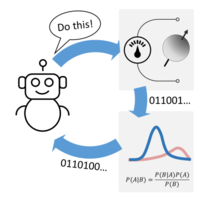Abstract
Quantum metrology promises unprecedented measurement precision but suffers in practice from the limited availability of resources such as the number of probes, their coherence time, or nonclassical quantum states. The adaptive Bayesian approach to parameter estimation allows an efficient use of resources because of adaptive experiment design. For its practical success, fast numerical solutions for the Bayesian update and the adaptive experiment design are crucial. Here we show that neural networks can be trained to become fast and strong experiment-design heuristics using a combination of an evolutionary strategy and reinforcement learning. Neural-network heuristics are shown to outperform established heuristics for the technologically important example of frequency estimation of a qubit that suffers from dephasing. Our method of creating neural-network heuristics is very general and complements the well-studied sequential Monte Carlo method for Bayesian updates to form a complete framework for adaptive Bayesian quantum estimation.
- Received 27 May 2020
- Accepted 17 March 2021
DOI:https://doi.org/10.1103/PRXQuantum.2.020303
Published by the American Physical Society under the terms of the Creative Commons Attribution 4.0 International license. Further distribution of this work must maintain attribution to the author(s) and the published article's title, journal citation, and DOI.
Published by the American Physical Society
Physics Subject Headings (PhySH)
Popular Summary
Imagine we want to measure a physical quantity, for example a magnetic field. In order to measure as precisely as possible, we don't detect the magnetic field “directly” but we use a quantum sensor as a “middleman”, consisting for example of an atom, which is sensitive to the magnetic field. Most information about the magnetic field can be gained from a series of measurements if we use adaptive measurements which depend on previous measurement results. But we have to keep in mind that some measurements are easier or faster to realize than others which has to be factored in. This brings us to the question considered in our work: What is the best strategy for choosing adaptive measurements? “A trained neural network” is our answer. Using reinforcement learning we are able to factor in all details of our quantum sensor such that the neural network outperforms previously known strategies.
The role of the neural network is that of a “brain in the sensor” which takes fast decisions on how to adjust the measurements. Using computer simulations of the quantum sensor, we create a virtual training environment in which the neural network gains experience and improves its behavior. Reinforcement learning rewards good decisions of the neural network and punishes bad ones. Finally, combining a trained neural network with a real quantum sensor gives us a “smart” quantum sensor.
Our method is very general and can be used to make all kinds of adaptive quantum sensors smarter. We envisage that the next generation of quantum sensors will be adaptive and smart.



